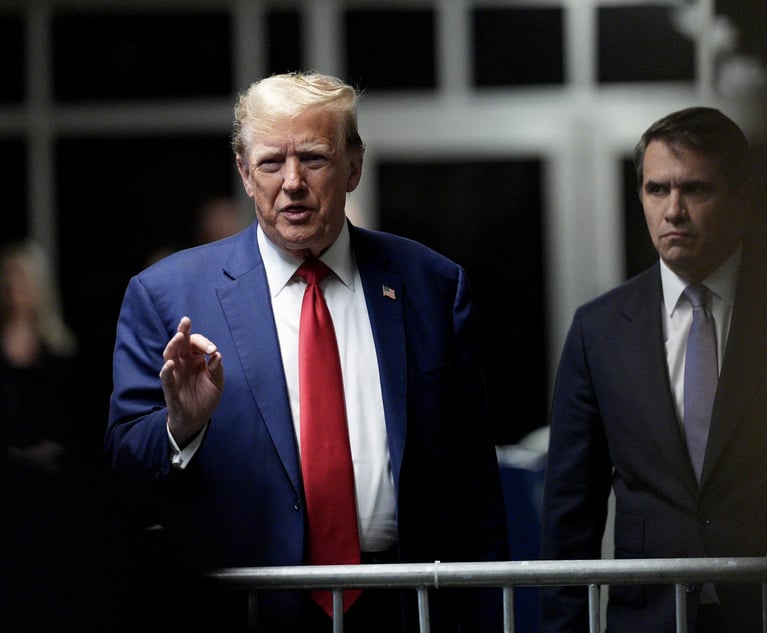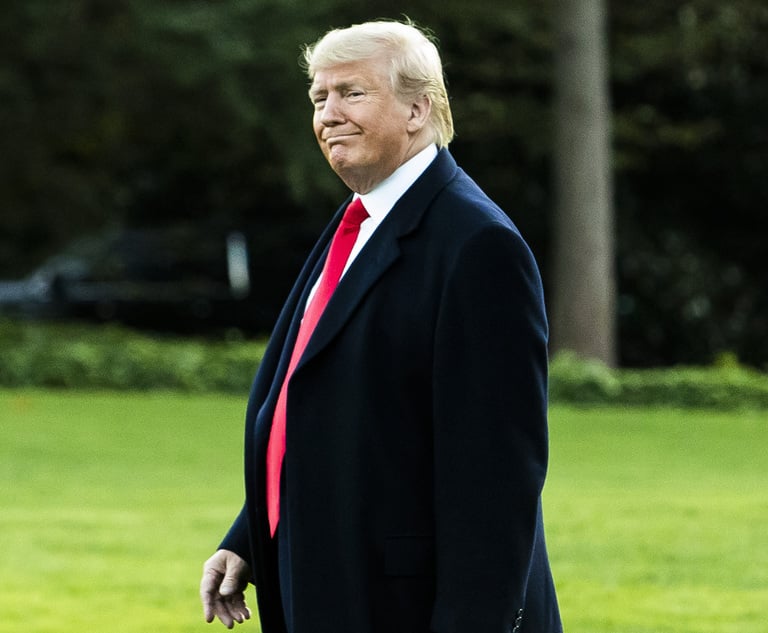Cannabis Law Practices Brace for Impact of Sessions Memo
Will the Trump administration's policy change on marijuana put a chill on law firms' slow embrace of cannabis clients?
January 04, 2018 at 06:10 PM
6 minute read
 Shutterstock.com
Shutterstock.com
New guidance from the U.S. Department of Justice on marijuana law enforcement has law firms with cannabis practices preparing for turmoil.
A growing number of lawyers have embraced the niche practice in recent years, and some said they worry the fledgling legal marijuana industry will suffer a chill that could affect transactional work. Other cannabis industry veterans said they only expect their practices to get busier.
U.S. Attorney General Jeff Sessions issued a memo Thursday rescinding prior guidance issued by the Obama administration on enforcing federal pot prohibitions. The 2013 guidance, known as the Cole memo, had discouraged federal law enforcement from bringing marijuana-related charges in states that have legalized the drug.
“The Cole memo gave lawyers some protection. Eliminating that takes us back to the Wild West,” said Andrew Sacks of Sacks Weston Diamond in Philadelphia, who has helped lead the charge for medical marijuana legalization in Pennsylvania. Still, he said, “we've been waiting for this.”
Rachel Gillette, a Denver partner in Greenspoon Marder's marijuana business practice, said Sessions' memo is “not new news”—even if clients are concerned, and the new guidance is vague.
“We've always known Attorney General Sessions' position on cannabis, and we've always known the federal law is contrary to state law,” Gillette said. “Am I going to wake up tomorrow and do the same thing I did today and yesterday? Yes.”
Potential Circumstances
Still, Thursday's news highlights the uncertainly marijuana lawyers have grappled with since President Donald Trump took office and made Sessions his attorney general. It's possible that for some lawyers, the new guidance could make for second thoughts about their role in the budding industry.
“Sessions threw a nuclear bomb into medical marijuana and recreational marijuana today,” Sacks said. “It's going to be up to the lawyers to make up their decisions on what to do, but they are violating federal law.”
Historically, said Brian Vicente, founding partner of cannabis law firm Vicente Sederberg in Colorado, lawyers haven't faced criminal prosecution or even state ethics implications for simply giving advice on marijuana issues, as long as they make federal law clear to clients.
But one California lawyer was charged last year in relation to her client's activities. Prosecutors in San Diego County have accused Jessica McElfresh of conspiring with a client to hide evidence of an illegal hash oil operation.
Still, lawyer ethics are not under federal jurisdiction, Shabnam Malek, partner at Brand & Branch and president of the National Cannabis Bar Association, noted. And lawyers with established practices are used to “living in ambiguity and anxiety.”
“Other than some federal prosecution or your client being subject to federal prosecution, my conduct is more or less protected in the state of California,” Malek said. “There's no reason why what Sessions said should scare me away.”
Digging In, or Stepping Back?
Regardless of the specific legal consequences, Sessions' memo is likely to rattle businesses that are on the fence about getting involved—and by extension, the law firms that work for them, lawyers said.
Vicente said states that are working toward marijuana legalization, like Michigan and New Jersey, and states that are implementing medical cannabis programs, are unlikely to quit now. But outside investors might become quieter.
“A lot of investors relied on this guidance … and now that guidance is gone,” Vicente said. “This is going to impact the banking industry and possibly put a chill on institutional investment.”
Like potential investors who have been watching cannabis developments with interest, law firms that were just about to dive into that type of work might choose to delay their plans, Malek said.
“I have a lot of friends in more mainstream law practices and they think this is a bad move on the part of the Department of Justice,” she said. “I don't know if it means they're going to scale back their cannabis law practices … but it doesn't add to their level of comfort.”
The mainstream firms are those midsize and larger law firms with large non-cannabis-related practices and many non-cannabis clients, Malek said. And they're more likely to back away from marijuana-related work, or at least do it more quietly.
“Law firms like mine or law firms that have been serving the cannabis industry in California for years … those people are not closing their doors because Jeff Sessions has a bone to pick with the cannabis industry,” Malek said.
Vicente said his firm, with 35 lawyers, focuses 100 percent of its attention on marijuana issues. The firm gets a lot of interest from young lawyers who want to get involved in that work, he said. While larger firms have started dipping a toe in the industry, Vicente said, the new guidance will likely cause some to retreat.
“It continues to be a cutting-edge area of the law and I relish that, but I think that sometimes scares away other lawyers,” he said.
Still, some Big Law firms already have a dog in the fight. Joshua Horn, co-chair of the cannabis practice at Fox Rothschild, said Sessions' guidance is just the beginning for lawyers like him. They will have to help clients understand their exposure to criminal charges. Lobbyists and local counsel will be ever more important to companies in the cannabis space, as those clients aim to work with local government to preserve state marijuana legislation and programs.
“The Cole memorandum never guaranteed that the federal government would never prosecute people, certainly in the recreational space, nor in the medical space. It just said that's not our priority,” Horn said. “That was always there, so the only thing that's really changed from my perspective is that his basically disregarding a memo that said it's not our priority to prosecute these cases.”
See Also: Q&A: Former DOJ Attorney Dissects AG Sessions' Marijuana Memo
This content has been archived. It is available through our partners, LexisNexis® and Bloomberg Law.
To view this content, please continue to their sites.
Not a Lexis Subscriber?
Subscribe Now
Not a Bloomberg Law Subscriber?
Subscribe Now
NOT FOR REPRINT
© 2025 ALM Global, LLC, All Rights Reserved. Request academic re-use from www.copyright.com. All other uses, submit a request to [email protected]. For more information visit Asset & Logo Licensing.
You Might Like
View All
Jay Clayton, Ex-SEC Chief and Sullivan & Cromwell Lawyer, Eyed For Manhattan US Attorney's Office

Legal Speak's 'Sidebar with Saul' Part II: GOP Pols Push Misinformation, Cohen Keeps It Together
1 minute read
Legal Speak: Aaron Sorkin This Is Not - Trump Trial with Emily Saul (Part 1)
2 minute read
Pillsbury Partner Representing Sean 'Diddy' Combs Following Homeland Security Raid
Trending Stories
- 1'Didn't Notice Patient Wasn't Breathing': $13.7M Verdict Against Anesthesiologists
- 2'Astronomical' Interest Rates: $1B Settlement to Resolve Allegations of 'Predatory' Lending Cancels $534M in Small-Business Debts
- 3Senator Plans to Reintroduce Bill to Split 9th Circuit
- 4Law Firms Converge to Defend HIPAA Regulation
- 5Judge Denies Retrial Bid by Ex-U.S. Sen. Menendez Over Evidentiary Error
Who Got The Work
J. Brugh Lower of Gibbons has entered an appearance for industrial equipment supplier Devco Corporation in a pending trademark infringement lawsuit. The suit, accusing the defendant of selling knock-off Graco products, was filed Dec. 18 in New Jersey District Court by Rivkin Radler on behalf of Graco Inc. and Graco Minnesota. The case, assigned to U.S. District Judge Zahid N. Quraishi, is 3:24-cv-11294, Graco Inc. et al v. Devco Corporation.
Who Got The Work
Rebecca Maller-Stein and Kent A. Yalowitz of Arnold & Porter Kaye Scholer have entered their appearances for Hanaco Venture Capital and its executives, Lior Prosor and David Frankel, in a pending securities lawsuit. The action, filed on Dec. 24 in New York Southern District Court by Zell, Aron & Co. on behalf of Goldeneye Advisors, accuses the defendants of negligently and fraudulently managing the plaintiff's $1 million investment. The case, assigned to U.S. District Judge Vernon S. Broderick, is 1:24-cv-09918, Goldeneye Advisors, LLC v. Hanaco Venture Capital, Ltd. et al.
Who Got The Work
Attorneys from A&O Shearman has stepped in as defense counsel for Toronto-Dominion Bank and other defendants in a pending securities class action. The suit, filed Dec. 11 in New York Southern District Court by Bleichmar Fonti & Auld, accuses the defendants of concealing the bank's 'pervasive' deficiencies in regards to its compliance with the Bank Secrecy Act and the quality of its anti-money laundering controls. The case, assigned to U.S. District Judge Arun Subramanian, is 1:24-cv-09445, Gonzalez v. The Toronto-Dominion Bank et al.
Who Got The Work
Crown Castle International, a Pennsylvania company providing shared communications infrastructure, has turned to Luke D. Wolf of Gordon Rees Scully Mansukhani to fend off a pending breach-of-contract lawsuit. The court action, filed Nov. 25 in Michigan Eastern District Court by Hooper Hathaway PC on behalf of The Town Residences LLC, accuses Crown Castle of failing to transfer approximately $30,000 in utility payments from T-Mobile in breach of a roof-top lease and assignment agreement. The case, assigned to U.S. District Judge Susan K. Declercq, is 2:24-cv-13131, The Town Residences LLC v. T-Mobile US, Inc. et al.
Who Got The Work
Wilfred P. Coronato and Daniel M. Schwartz of McCarter & English have stepped in as defense counsel to Electrolux Home Products Inc. in a pending product liability lawsuit. The court action, filed Nov. 26 in New York Eastern District Court by Poulos Lopiccolo PC and Nagel Rice LLP on behalf of David Stern, alleges that the defendant's refrigerators’ drawers and shelving repeatedly break and fall apart within months after purchase. The case, assigned to U.S. District Judge Joan M. Azrack, is 2:24-cv-08204, Stern v. Electrolux Home Products, Inc.
Featured Firms
Law Offices of Gary Martin Hays & Associates, P.C.
(470) 294-1674
Law Offices of Mark E. Salomone
(857) 444-6468
Smith & Hassler
(713) 739-1250









